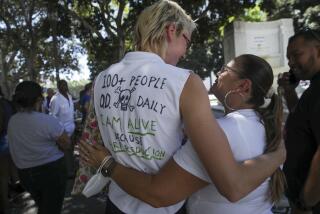About 88,000 U.S. deaths each year traced to alcohol use, study says
Alcohol is responsible for about 88,000 deaths in the U.S. each year, according to a new government report on the toll of excessive drinking.
The study, published Thursday by the Centers for Disease Control and Prevention, comes as police investigate an alleged drunk driver who struck and killed two people early Thursday morning at the South by Southwest festival in Austin, Texas. Another 23 people were injured after the driver went the wrong way on a one-way street in an apparent attempt to evade an officer who had pulled him over. Austin police Chief Art Acevedo said officials planned to charge the driver with two counts of capital murder and multiple counts of aggravated assault.
The CDC report calculated that fatalities due to drunk drivers and more than 50 other alcohol-related causes of death are responsible for wiping out about 2.5 million years of potential life each year. Americans between 20 and 64 were victims in the majority of alcohol-related deaths, so many of them would have lived for many more years if alcohol hadn’t killed them (either directly or indirectly).
The research team, from the CDC and representatives from health departments in 11 states, used information from the CDC’s Alcohol-Related Disease Impact database. The database tracks 54 causes of disease and death that are influenced by alcohol to some degree. For instance, alcoholic liver disease, fetal alcohol syndrome and alcohol poisoning are among the diseases considered 100% attributable to drinking, while liver cancer, hypertension, stroke and accidents may be partially related to alcohol use. Even causes of morbidity and mortality that are as little as 1% attributable to excessive drinking are tracked in the database.
The researchers from the 11 states — California, Florida, Michigan, Nebraska, New Mexico, North Carolina, North Dakota, South Dakota, Utah, Virginia and Wisconsin — each examined data from their own state for the years 2006 to 2010. They counted up the cases of disease and death in each of the 54 categories and multiplied them by the fraction for which alcohol was responsible. They also looked up the life expectancy for each person who died (based on their age, gender and race or ethnicity) to tally the number of years of life lost.
Overall, the median death rate due to alcohol-related causes was about 28.5 per 100,000 people, after adjusting for the age of victims. (Half the states had a rate higher than that, and half had a rate that was lower.) The lowest alcohol-related death rate among the 11 states was in Utah (22.4 deaths per 100,000 people) and the highest was in New Mexico (50.9 deaths per 100,000 people).
Senior citizens who were at least 65 years old had the highest rate of alcohol-related deaths, at about 60.3 per 100,000 people. Meanwhile, those under the age of 20 suffered only 4.1 alcohol-related deaths per 100,000 people. Men were more than twice as likely as women to die of an alcohol-related cause, by a margin of 42.4 per 100,000 to 15.8 per 100,000.
The researchers also noted that while the majority of alcohol-related deaths involved non-Latino whites, the highest death rate was seen among Native Americans and Alaska Natives (at 60.6 deaths per 100,000 people).
The statistics “highlight the ongoing public health impact of excessive drinking in the United States,” the researchers concluded. The casualty figures could be reduced by implementing policies that make alcohol more expensive and that reduce the density of liquor stores and other outlets that sell alcohol. The researchers also recommended that retailers be held responsible for the damage that ensues after selling alcohol to minors or to people who are already intoxicated.
The study was published Thursday in the CDC’s Morbidity and Mortality Weekly Report.
If you’re interested in the latest scientific and medical studies, you like the things I write about. Follow me on Twitter and “like” Los Angeles Times Science & Health on Facebook.







